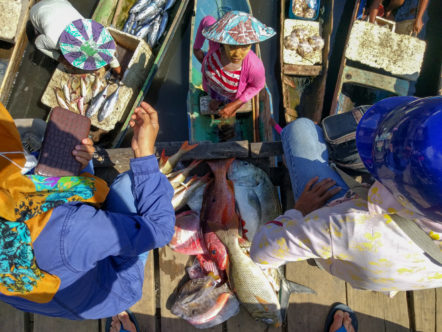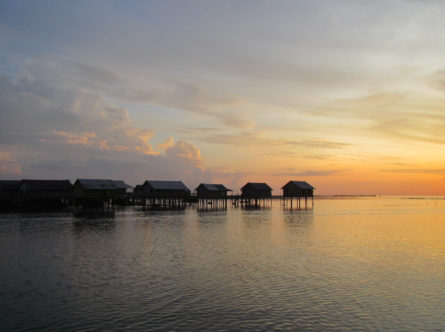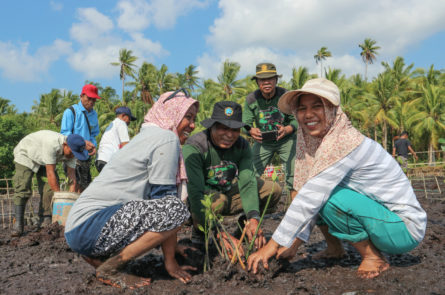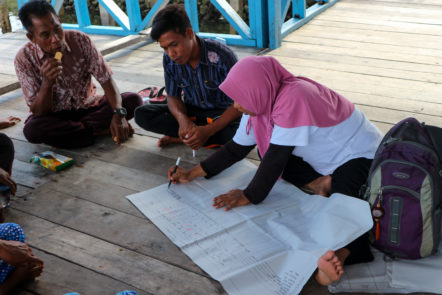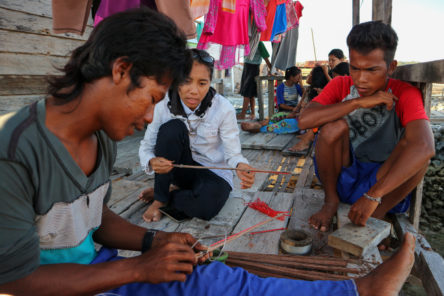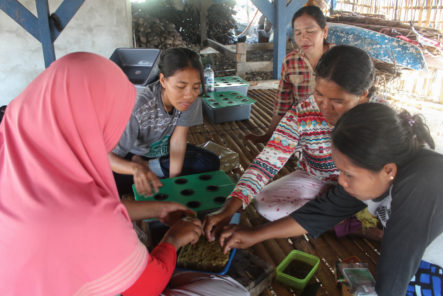This post is also available in:
 Indonesian
Indonesian
This is the second blog in our Women in Fisheries series.
On the wall alongside the long, worn wooden table where FORKANI’s team eat their meals together and work, sometimes late into the night, a small poster is fixed to the wall. It spells out the the organisation’s name in full: FORum KAhedupa toudaNI – a forum or group focused on supporting and promoting the toudani of the island of Kaledupa (traditionally ‘Kahedupa’), part of the Wakatobi archipelago in southeast Sulawesi. But what, I wondered, is toudani? I asked the FORKANI staff around me, sipping coffee and smoking cigarettes in the evening shadows, if they could explain.
It turned out that it’s difficult to translate the word toudani directly, but this one word is central to FORKANI’s mission and approach. It refers to the longing of someone who has left their homeland, for their culture, landscapes and community, or a connection with one’s place of origin, something that FORKANI works to build and encourage. Established in 2002, FORKANI works with communities throughout the Wakatobi archipelago on a range of environmental, fisheries and socio-cultural projects. As well as running its own projects on Kaledupa, FORKANI provides support and assistance to several other small community-based organisations working in other parts of the Wakatobi archipelago.
The Wakatobi National Park aims to protect the diverse coral reefs and fish populations in this area, by reducing destructive fishing practices and overfishing, and through the designation of protected areas. However, communities living within the national park’s boundaries are dependent on its marine and terrestrial environments for their livelihoods. The balance between meeting people’s needs and protecting important environments on land and in the sea can be a challenging one to strike. FORKANI works both with the national park authorities and local communities in the region, using approaches which integrate local customs and traditional practices, to inspire stewardship of these habitats for future generations and to reignite a connection with place and culture amongst the people of Wakatobi.
Nurmayanti, known to everyone as Yanti, is one of the earliest members of FORKANI, and one of two women initially involved with the organisation’s work. She first became involved with FORKANI some ten years ago, but after several years she left Wakatobi to pursue a government job, meeting the expectations of her family and community. But during her two years as a village facilitator for the local development programme in southeast Sulawesi, Yanti never stopped missing Kaledupa. Eventually she gave up the quest to work her way up the promotional ladder, to move back to Kaledupa and rejoin FORKANI. She told me that she’s happy with her decision. “I couldn’t imagine sitting behind a desk and typing all day”, she confides. Interacting with the communities, landscapes and seascapes she knows as home is clearly what motivates her.
Yanti’s role within FORKANI involves juggling a plethora of tasks. She has led a mangrove replanting project with a youth group in Sandi, the village where she grew up. She is involved in assessing the health needs of communities and building partnerships with local healthcare centres. She provides training to community members and encourages them to document their traditional systems of farming, weaving, cooking and managing natural resources, so that they will not be forgotten and may even be revived. She is also working to support community-led fisheries management with the community of Darawa, a nearby island.
With such a huge remit, I wonder, what does she enjoy most about her job? She answers without hesitation – protecting the natural environments in Kaledupa is by far the most rewarding element. Her connection to Kaledupa’s environment is evident – she tells me that any time she has to leave the island, she misses the trees, the springs and rivers. She seems the perfect ambassador for FORKANI’s work to revive the sense of toudani within communities, connecting them once more to the natural world around them, and the identity and pride that comes with it.
Breaking down gender stereotypes
Yanti is eager to share her stories about work, family and community, and especially about the challenges she has faced as a woman working in a conservation NGO. Whilst respecting her Muslim culture and upbringing, she far from fits the traditional role of a woman in this society. “This is not a traditional job”, she ventures. “It’s not like being a teacher, secretary, or the owner of a business. People know what those jobs involve”. Because the roles and activities of FORKANI’s staff are not traditional and well-known jobs, there was and continues to be some misunderstanding in the Ambeua community, where FORKANI is based, about what they do. Boat journeys and visits to other communities in Wakatobi; spending hours talking with community members to explain concepts around management and conservation – these things don’t look like work to many people. “My friends sometimes ask me, ‘when will you get a real job?’”, she says, wryly. I do not doubt for a moment that she has experienced some sense of isolation in the face of the disappointment and confusion expressed by her family, yet she speaks fearlessly about her commitment to FORKANI’s work and seems content with the choices she has made.
Going against the grain in a traditional society cannot be easy, and gender stereotypes are strong in this region. In Ambeua, some consider the presence of unmarried women amongst the many young men in FORKANI to be improper, and have questioned what takes place at the organisation’s office. Yanti was pressured by her parents to marry – women usually marry in their twenties, she tells me, and she is now 32. She has been told that it was not appropriate for a hijab-wearing woman to go into the jungle or ride fast on a motorcycle – the association being that women who wear a hijab should stay at home and do traditionally female tasks. In the face of all this, I’m amazed by her conviction. “I don’t need to explain what I’m doing – my work will prove its own value”, she says with a quiet confidence. She believes that as long as she is adhering to the rules of her faith, she sees nothing wrong with being somewhat unconventional in the work she does. And after years of commitment to FORKANI, her family have come around to supporting her in her choices and her work.
I don’t need to explain what I’m doing – my work will prove its own value”
Over the course of the hour we have been speaking, I have been humbled by Yanti’s remarkable strength of character. Although she denies it, I suspect that simply as a result of her visibility and commitment to FORKANI’s work, she has become a role model for many other young women in the Wakatobi region.
Speaking to Dita Kamal, a younger member of FORKANI, my suspicion is confirmed. Dita’s father is a long-standing member of FORKANI, so she was exposed to the organisation’s work from her early teens. Nonetheless, she tells me that the presence of Yanti and her female colleague Nusi, and their key roles within FORKANI, showed her that “if you are doing things that benefit a community, even if it goes against cultural norms, you shouldn’t let that limit you”. Dita is pushing her own boundaries, documenting the traditional culture and fishing practices of the Bajo community in Mantigula using video, photography and interviews, and providing training in hydroponics to women’s groups. She has had to immerse herself in their culture and even learn to speak Bahasa Bajo, the local language. It’s inspiring to see young women going beyond their own comfort zones and playing key roles in FORKANI’s work. Yanti’s close and supportive relationship with FORKANI’s younger members has clearly played a part in this, as has the unique way in which FORKANI provides a space for open discussion and engagement amongst its members, regardless of gender, age or beliefs.
Engaging women as messengers of sustainability
Women have important roles in the family in this area and indeed, throughout Indonesia. Yanti sees educating women on sustainability issues as a way of reaching all sectors of society. “When a woman understands, for example, that cutting mangroves has many negative effects on fisheries and the environment, then she will share that understanding with her husband, her children – the whole family. So engaging with the women of a village is an effective way of getting a message to all sectors of a community”. But beyond simply sharing information, there is strong evidence that including women in management groups and activities encourages better resource governance and conservation outcomes (although much of this evidence comes from forest rather than fisheries ecosystems). FORKANI is encouraging members of village women’s groups – known as PKKs – to become more involved in fisheries management, by attending meetings and voicing their experiences and ideas. In the future, they hope to mobilise PKK members to become active in the collection, interpretation and feedback of fisheries data to their own communities. Yanti plays a key role in this work, not only because she has, over the years, established close relationships with the communities where FORKANI works, but also because she is leading by example, showing other women that they have skills, knowledge and capacity which are essential for a holistic and inclusive approach to fisheries management.
When a woman understands, for example, that cutting mangroves has many negative effects on fisheries and the environment, then she will share that understanding with the whole family. So engaging with women gets a message to all sectors of a community”
Following what some perceive as an unconventional path by refusing to conform to gender stereotypes, Yanti is leading the way in bringing communities full-circle, back to their traditions, their connection with the natural world around them, and to sustainable livelihoods brought about through a revived sense of toudani.

Illustration: Indah Rufiati
Read more from our Women in Fisheries series:


